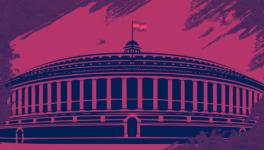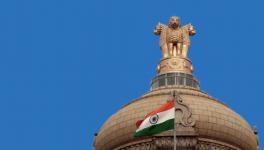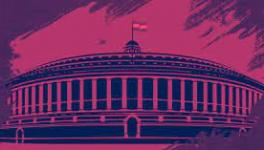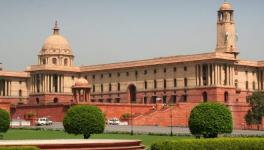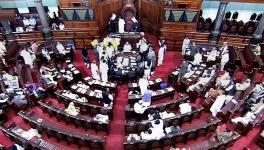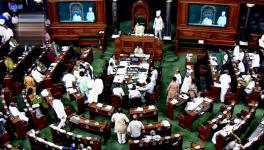How Lok Sabha MPs Elected From Reserved Seats Fared in Parliament
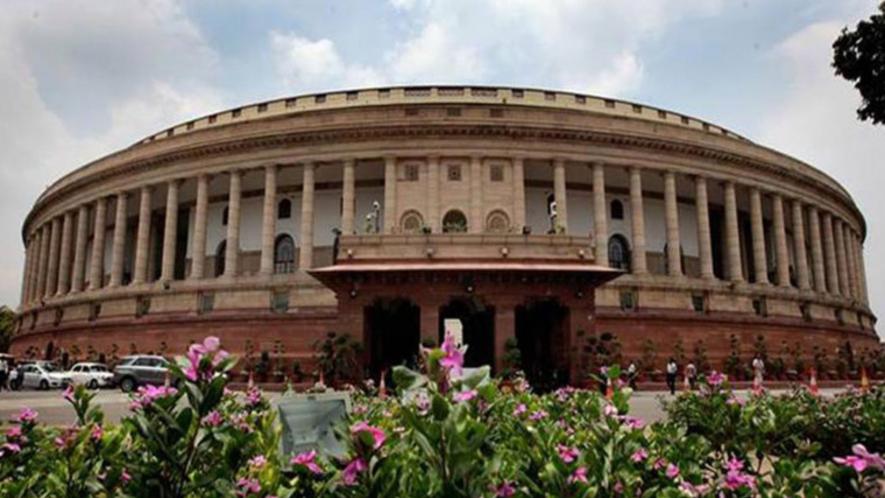
Representational Image. Image Courtesy: PTI
Digging deeper into the performance of sitting Members of Parliament, we look into the performance of Lok Sabha members (as on 17 September) representing reserved constituencies. We analyse the top and bottom performers among them and how those elected from reserved seats in the so-called BIMARU states—Bihar, Madhya Pradesh, Rajasthan and Uttar Pradesh—fared in Parliament.
Demographer Ashish Bose coined the term ‘BIMARU’ to describe four of the poorest and least performing states. These states coincide with the Hindi heartland, where the Bharatiya Janata Party hopes to drum up mass support in the 2024 Lok Sabha election.
Currently, the Lok Sabha has 539 sitting members, as four seats, including the reserved Ambala constituency, are vacant. There are 131 Members of Parliament from reserved seats, of whom 125 actively participate in the Lok Sabha proceedings. Five of the members elected from reserved constituencies are in the central Cabinet, so they do not have to sign the attendance register as they represent the government.
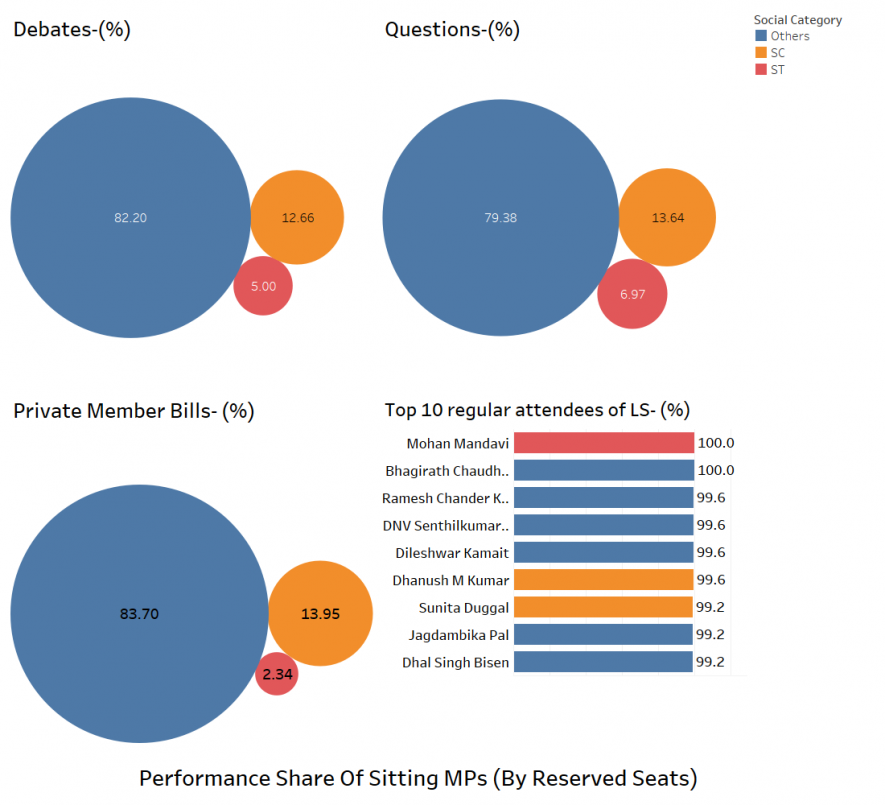
After excluding those serving in the central Cabinet and vacant seats, the total number of Members of Parliament eligible for various parliamentary tasks drops to 481. The 125 Members of Parliament from reserved seats account for a 25.98% share of these 481. Their participation is analysed along three parameters—raising questions, participating in debates, and introducing Private Members’ Bills.
First off, the data shows, the share in representation of Scheduled Caste and Scheduled Tribe Members of Parliament does not align with their participation. Their cumulative participation in debates amounts to 17.66%. This rises to 20.61% when it comes to the category of questions asked, but contracts to 16.26% in terms of introducing Private Member Bills.
Among the top ten regular attendees of the Lower House of Parliament, the members elected from a constituency reserved for a Scheduled Caste or Scheduled Tribe lag behind. Among the top 10 attendees of Parliament, only three are from reserved seats; one reserved for Scheduled Tribe contestants and two for the Scheduled Caste communities.
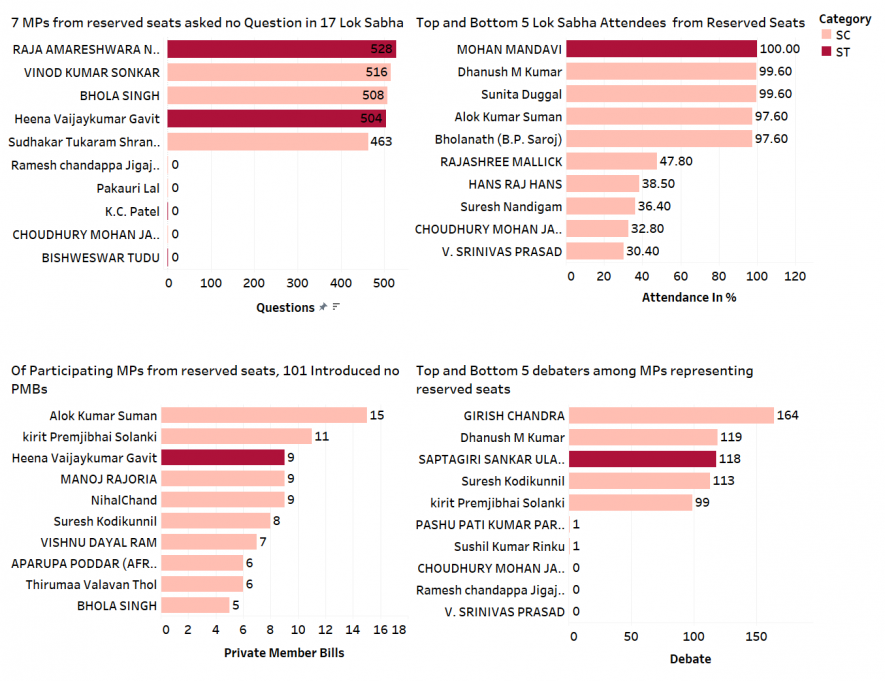
Notably, Mohan Mandavi, Member of Parliament from the Kanker parliamentary seat in Chhattisgarh, places first on this list of top ten. He has the highest attendance among leaders elected from reserved seats. Kanker is a constituency reserved for Scheduled Tribes.
But in general, those elected from constituencies reserved for Scheduled Caste candidates are more active than those from constituencies reserved for Scheduled Tribes. Among the top five members to raise questions in the House from a reserved seat, three are from Scheduled Castes and two are from Scheduled Tribes. It is noteworthy that seven of the 125 Members of Parliament posed no questions so far in the 17th Lok Sabha.
Private Members Bills
A total of 118 Private Members’ Bills have been introduced by the Members of Parliament from a reserved seat. But only one Member of Parliament from a seat reserved for a Scheduled Tribe candidate features on the list of top ten movers of Private Member Bills. Additionally, 101 Members of Parliament from reserved seats have not introduced any Private Members’ Bill so far in the latest Lok Sabha.
There is no Member of Parliament representing a reserved Scheduled Tribe constituency in the list of the bottom five debaters. And, only one such leader appears in the top five debaters. Taken together, these facts suggest that the number of questions posed by any individual Member of Parliament from a Scheduled Tribe seat has been relatively lower compared to those elected from a seat reserved for Scheduled Castes.
Seen collectively, Members of Parliament from Scheduled Tribe seats were more active in this category.
Oversight role
What matters even more than the number of questions posed or debates that Members of Parliament representing reserved seats participate in is their role in providing oversight. That is, their role in raising concerns of the communities and regions they represent.
Analysing the ten latest questions posed by the top five questioners from this category, surprisingly, we do not see the Members of Parliament raising concerns of their communities. This poses an interesting conundrum.
The questions these Members of Parliament have raised range from the “menace of dog bites”, and the “promotion of film tourism” to the “online gaming industry”. In fact, none of the ten latest questions raised by them relates to concerns particularly of members of the Scheduled Castes and Scheduled Tribes.
This trend is significant. While every Member of Parliament would raise issues of national and/or regional relevance, the reserved seats are an avenue to represent the specific concerns of the disadvantaged sections of society. Considering the increasing atrocities against the tribals and Dalits, it is significant that most of the recent questions posed by active members elected from reserved seats did not focus on these burning issues.
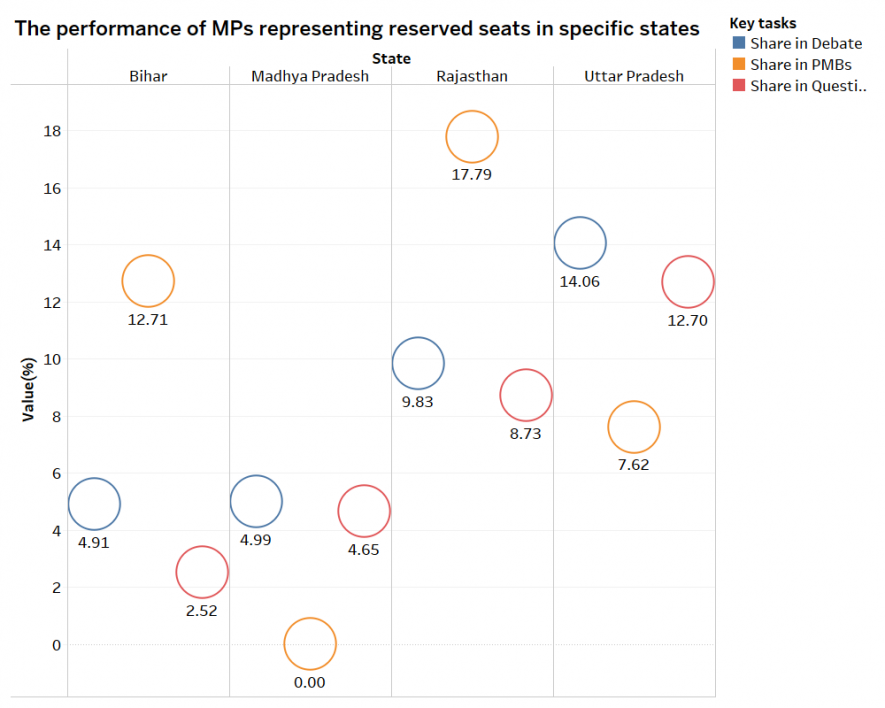
Where ‘BIMARU’ States Stand
The proportion of Members of Parliament from reserved seats eligible to participate in house proceedings as a percentage of the total eligible Members of Parliament from reserved seats, is 4.8% for Bihar, 7.2% for Madhya Pradesh, 4.8% for Rajasthan, and 13.6% for Uttar Pradesh.
There are two Members of Parliament elected from one reserved seat each in Madhya Pradesh and Rajasthan, who are in the central Cabinet.
The list of the top five Members of Parliament elected from reserved seats in terms of raising questions includes two from Uttar Pradesh: Vinod Kumar Sonkar and Bhola Singh, who represent the Kaushambi and Bulandshahr constituencies respectively. Both are reserved for Scheduled Castes. Surprisingly, their ten latest questions are all the same, and none address issues related to the Scheduled Caste community. Their questions focus on topics like menace of dog bites, the Suvidha Sarthi Scheme, and unreserved coaches of trains, etc.
The maximum number of questions from a reserved seat in Bihar is posed by Alok Kumar Suman. Suman represents the Gopalganj constituency which is reserved for a Scheduled Caste candidate. He has asked a significant number of questions—246 in the 17th Lok Sabha—so far.
His latest ten questions raised in Parliament relate to the non-availability of nutrition schemes in rural areas and minimal data speed. Arguably, these are concerns of the poorest Indians, who would include the most disadvantaged sections. However, none of the ten questions he asked specifically related to the Scheduled Caste residents of Gopalganj.
Anil Firojia, representing the Ujjain constituency of Madhya Pradesh (reserved for Scheduled Caste), has asked 251 questions—the highest from a reserved seat in the state, until 11 August 2023, the last day of the 12th session of the 17th Lok Sabha. His ten latest questions highlight issues like the treatment of Hepatitis B, misuse of Aadhaar cards, etc. Once again, these issues relate to all constituents, but not specifically his Scheduled Caste constituents.
Analysing the same parameter for Rajasthan, we find that Member of Parliament Nihal Chand Chauhan, representing the Gangangar constituency in Rajasthan reserved for Scheduled Castes, asked 289 questions during the latest Lok Sabha. However, he, too, did not address the issues of the Scheduled Caste community.
Note: Data represents the performance of sitting MPs from reserved seats who are not serving in the central Cabinet.
Data corresponds to the period from 1 June 2019 to 11 August 2023
Source: PRS Legislative Research and ECI, author’s calculations.
The author is an independent journalist. The views are personal.
Get the latest reports & analysis with people's perspective on Protests, movements & deep analytical videos, discussions of the current affairs in your Telegram app. Subscribe to NewsClick's Telegram channel & get Real-Time updates on stories, as they get published on our website.










